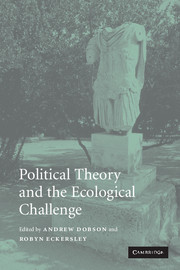7 - Cosmopolitanism
Published online by Cambridge University Press: 06 July 2010
Summary
The long-term moral consequences of a series of revolutions in technology and communications which have brought all human societies into a single global political and economic system remain unclear; Kant's question of whether the ‘oceans make a community of nations impossible’ is relevant two centuries on (Kant 1965: 126). The global media have increased public awareness of suffering in other places, but distance continues to block the extension of solidarity and sympathy beyond the nation state. Global environmental problems have deepened awareness of the interdependence of the species, but it is not certain they will overcome the age-old effects of the ‘tyranny of distance’ on political loyalty. Will powerful cosmopolitan commitments develop because of global environment problems? What cosmopolitan ethic is most appropriate for a world facing serious environmental threats and challenges?
Kant's answer to his question about the effects of distance on moral and political community frames the present discussion. He pointed to the ambiguities of globalisation in his era. Advances in oceanic navigation created new possibilities ‘for doing evil and violence to some place on our globe’ (1965: 126). Observers in our time make a similar point when they argue that globalisation allows the most technologically advanced societies to damage the natural environment without great cost to themselves.
- Type
- Chapter
- Information
- Political Theory and the Ecological Challenge , pp. 109 - 128Publisher: Cambridge University PressPrint publication year: 2006
References
- 9
- Cited by



